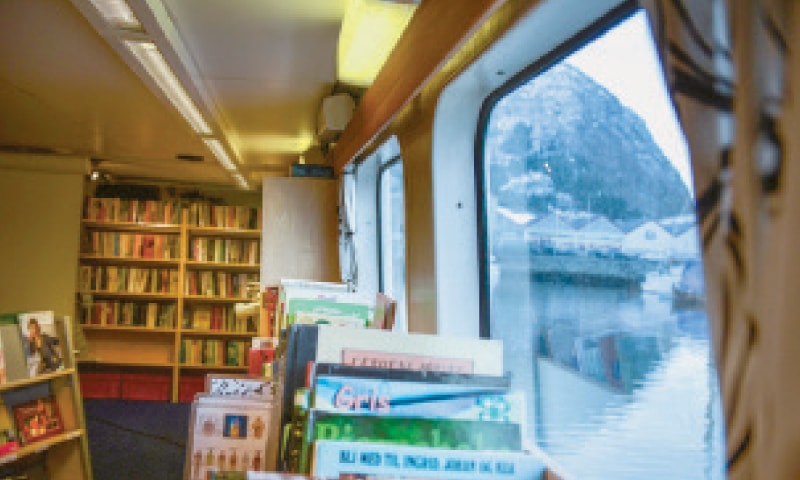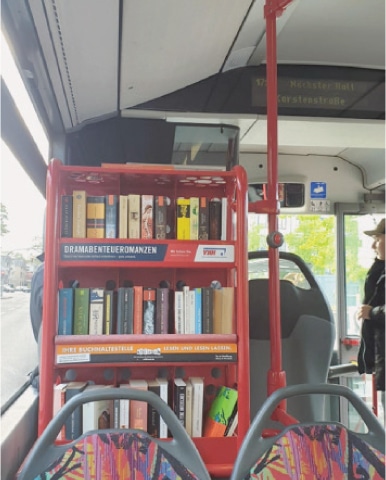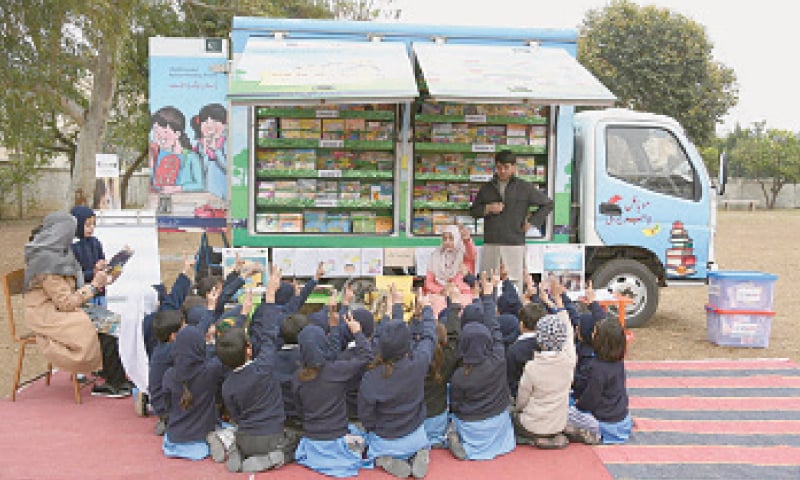If you need to check a reference or want to read one of your favourite writers’ latest book but do not want to buy it, what do you do? Obviously, you go to your school library, or if you are lucky enough to have a public library in your town, you go there and get what you need.
When we talk of a library, we get the image of a building with rows and rows of shelves with books neatly stacked on them. You borrow the book and bring it home to read at leisure or you sit there and read in the quiet serene atmosphere.
There are marvellous libraries in the world known for their huge collections, such as the New York Public Library, National Library of China in Beijing, Library of Congress Washington, British Library London, and Russian State Library Moscow.
However, one cannot go to these magnificent libraries every time one has the urge to read. People living in remote areas do not even have access to a library in their school or a public library in their town. So, for people living in remote areas or with little access to books, very innovative ways have been devised to give them access of libraries, in some cases even bringing books to their doorsteps.
These libraries have stepped out of the conventional buildings and embraced amazing shapes and forms, but share the common purpose of offering books to people to enjoy and learn from.
Let us see what these unique libraries are like and how each suits the particular need of the place and the people it caters to.

Camel library
Camels not only carry load or give you a ride on the beach, they can also carry books on their backs. The Kenya National Library Service started a programme in 1985 to serve the nomadic communities where literacy rates are as low as 15 per cent and there is a lack of reading material.
The book-carrying camels camp in open spaces and whoever wants to read can go there, select a book, read it and then put it back in the book trunk. The camels travel from one place to another along with their books and camping material, which they require when they need rest.
Camel libraries are also found in other places, such as Mongolia, where camels are still used to access remote regions.

The Biblioburro or the donkey library
While camels are used to deliver books in Kenya, donkeys are used for the same purpose in Colombia, South Africa. In his spare time, Luis Soriano, a primary school teacher, loads books on his two donkeys, Alpha and Beto, and travels to remote villages, where he not only reads to the children but also lends them books from his mobile library.

Library ship
A book boat known as ‘Epos’ sails to more than 250 small communities on islands in Fjords, Norway, every year between September and April, with about 6,000 books.
On board the ship, there are the captain, a cook, a couple of librarians and one or two entertainers, which make this library a unique experience. Started in 1959, the service is funded by the libraries of the three counties — Hordaland, Sogon og Fjordane and More og Romsdal — that it serves. In summer, the floating library turns into a leisure cruise ferry.

Arma de Instrucción Masiva
The name is intriguing, but it really is a library. In fact, this library in Argentina represents a dark time in the country’s history (the Argentine War of Independence).
Activist-artist Raul Lemesoff took a 1979 Ford Falcon — a vehicle that was popular with the armed forces of the military dictatorship at the time — and transformed it into a mobile library in the shape of a tank. Loading it with hundreds of books, he tours through the country’s urban centres and rural communities that do not have access to traditional libraries and allows anyone who is interested in reading to borrow a book. He views his work as a mission “to contribute to peace through literature.”

Mailbox library
You must have seen mailboxes in the front yard of houses, in movies or old magazines. In a novel idea, some counties in England and other European countries have converted these mailboxes into small libraries that houses about 10 or more books.
The idea is to share one’s love of reading with the community. There are several hundred such libraries across US and Europe. This only makes sense since the regular postal system the world over is being used very little, the mailboxes are coming to better use.
How about erecting such a box in your house front or neighbourhood, and starting a free library? Good things should always be emulated

Phone booth library
Just like mailboxes having little use these days in the age of emails and messages, phone booths too have become almost redundant in most places.
When the British Telecom wanted to remove the phone booths in Westbury, a town in southern England, the locals decided to transform these booths into small libraries. Run by volunteers, people can take or leave a book. The books that become a bit frayed are sent off to local charity shop and new books are stocked.

Vending machine libraries
You can not only take out your favourite soft drink from a vending machine, but can also pay a fee and vend out a book you wish to read. The concept of book-vending machine is not new, but in recent years more and more libraries are being set up on busy streets, at train stations and in shopping centres.
The idea has gained global popularity and in one district in Beijing, China, machines account for 31.6pc of the books borrowed.

Library on a public bus
Brazilian bus collector Antonio da Conceição Ferreira, 42, has a passion for reading, and this passion inspired him to create what he calls, ‘Culture on the Bus’. He transformed the bus he rides into a small library.
Initially, he carried a cardboard box full of books and wrote the names of people who took the books, but now the books are lined on a shelf inside the bus and passengers can read while riding. He does not care if people return the books or not, as the idea is that the books are passed from person to person.
Buses in other countries have also been spotted having a small shelf for passengers to pick up a book and pass away the time.

Beach library
While on a beach, you walk on the sand or venture in the water for a swim. However, sometimes after a tiring swim or while sun bathing, one feels like picking up a book to read. You must have seen a few avid readers laying on the beach with a book for company.
For such people there is a library on the sandy beach of Bulgarian Black Sea resort. It was German architect Herman Kompernas’ idea to build a library there and he stocked it with over 2,500 books in 10 languages. Guests can borrow the books for free and leave their own for others to read.
Now beaches in many other countries have started having libraries which have gained popularity with beach and book lovers.

Mobile libraries in Pakistan
Virtually none of the public schools in Pakistan have a library, and the culture of reading outside the recommended curriculum is almost non-existent. Realising this, various programmes were started from time to time to bring books to those who do not have access to books or cannot afford to buy them.
Colourfully decorated buses loaded with diversified and attention-grabbing books visit various schools in rural and far-flung areas, bringing joy to students who eagerly wait for the next visit of these buses.
Bookmobiles, as these mobile libraries are also called, exist in many other parts of the world and have been there since there have been buses.
Published in Dawn, Young World, February 1st, 2020
















































Dear visitor, the comments section is undergoing an overhaul and will return soon.